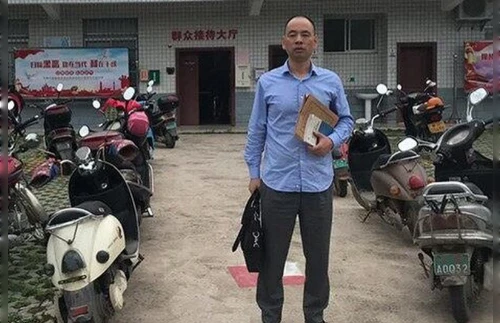The Dycks left the XUAR after 10 years because they were ‘making it dangerous for our friends.’

Canadian nationals Andrea and Gary Dyck lived in northwest China’s Xinjiang Uyghur Autonomous Region (XUAR) for 10 years, beginning in 2008, during which time they spent five years studying the Uyghur and Mandarin languages at Xinjiang University in the regional capital Urumqi. In 2014, the couple moved to the eastern XUAR’s prefecture-level city of Turpan (in Chinese, Tulufan), where they ran a business helping farmers to raise organic produce and improve the quality of their soil through composting.
The Dycks left China in 2018 as they noticed that restrictions on the daily lives of Uyghurs in the XUAR increased dramatically. The couple said that by then, Uyghurs were routinely subjected to discrimination, the prohibition of cultural and religious practices, and regular monitoring through a high-tech surveillance system comprised of facial recognition cameras and checkpoints that singled them out for searches and interrogations. Since they left China, a growing amount of evidence suggests that in addition to the crackdown, authorities have deployed a number of other measures targeting Uyghurs, including forced sterilizations, coerced labor, and a campaign of mass incarceration through which an estimated 1.8 million people have been held in a vast network of internment camps since early 2017. Together these rights violations have been labeled part of a policy of genocide in the XUAR by the U.S. government, as well as the parliaments of Canada, The Netherlands, and the U.K.
RFA recently spoke with the Dycks, who last week moderated an online panel on The Uyghur Genocide in China in coordination with the Canadian Museum for Human Rights. Speaking on the panel were Uyghur Canadian activist Mehmet Tohti, who co-founded the World Uyghur Congress exile group and serves as executive director of the Uyghur Rights Advocacy Project in Ottawa, and Adrian Zenz, a German researcher and Senior Research Fellow in China Studies at the Center of the Victims of Communism Memorial Foundation in Washington, who was one of the first experts to collect evidence on the situation in the XUAR’s internment camps. The couple described to RFA how life changed for themselves and Uyghurs in the XUAR as Beijing began to tighten its grip on the region.
Andrea Dyck: China did not directly ask us to leave but the restrictions were getting more and more difficult so that we would probably not be able to get the residence permit that we needed to keep staying. But at the same time, we actually made the decision a little sooner. We were living there with our children and we were seeing how much more difficult it was getting for everyone around us, and we also recognized that the others around us were being taken to the camps more and more frequently and they were all afraid and they could be taken away for very little reason. And so, we realized that for some of them to be seen with us could be risky. We realized that it wasn’t worth it to stay if it was making it dangerous for our friends. We also found it very, very difficult to watch what was happening and we realized that for our children we needed to come back.
Gary Dyck: It was the little things that we saw that stuck out to us every week in Turpan and probably every city in Xinjiang every week, starting in 2017, and even 2016—there was a new rule, a new restriction, more security.
Sometimes it was a new fence on the on the street so you can’t cross the street, and now you’re not supposed to have a beard, men can’t have long beards, or it was a problem. Skirt length became a problem … Other things like cameras—all of a sudden there’s cameras, they’re supposed to be on every intersection, and then there was a checkpoint between Turpan and Urumqi … and then between Turpan and the villages, there was one. And now there’s two checkpoints between Turpan and the village too, and then just every week there was one new thing at least … Three things to change are hard, but every week for months and months and months. It just was too hard for our minds to comprehend.
Andrea Dyck: And we knew that these kinds of things are not without a purpose, we could see that this was going into a bad direction.
Gary Dyck: It was very intentional by the government.
‘It was just all fear’
Andrea Dyck: At first, some of my friends said, “They’re keeping us safe.” And I’m thinking, “What are they keeping you safe from? There is no danger.” And the other thing that was happening at the same time is the people were expected to work many, many extra hours. A lot of my friends, they no longer could have a day to stay home. They had to stay late after work for meetings and more meetings telling them all the new rules. One of my friends was forced to stay at her work office to sleep when her son came back from Urumqi for the New Year holiday, she could not go home to cook him a meal even though it was only two blocks away.
I had one woman tell me when she was alone with me for a few minutes that every day, all day, every official or their employers would say, if you don’t do this, we will send you to “the school” … So that fear is put in front of them all day.
Also, the families were separated in so many ways. We saw the streets getting emptier. We saw there were less people on the streets, and we knew many of them have been taken to the camps … By the end of our time there, we looked at ourselves and we thought our whole family is in our apartment, but we knew almost no other families where everyone was still in their house.
It was late 2016 when we saw the police stations were set up on every corner of the major intersections and in the spring of 2017, we visited Urumqi and some friends said that at that time the police had to take six people away every day just for a quota … And so, from there it became very, very alarming … just police everywhere on the corners of streets, driving in vans around all the time … And then it was the Islamic ceremonies and religious things that became problems and there were rules against those things, but then soon it was just normal Uyghur culture [that was prohibited]. There was one day where my friends said, “Now we’re not allowed to have naan.” The naan ovens outside were dismantled. You couldn’t cook kabobs on the street. And the officials said it wasn’t healthy and was bad for the environment.
When we moved to Turpan in 2014, there was more joy on the streets, people were friendly, people invited us to their homes. We sat outside and had meals and I got invited to join for chai.
Gary Dyck: But then, starting in 2017 … It was all gone. It was just all fear.
‘I can’t just keep it to myself’
Andrea Dyck: We experienced Uyghurs as such gentle beautiful people. We have just been so blessed by the friendships that we had, the hospitality, the wisdom … To me they’re like the opposite of a terrorist—just gentle, farming, educated people. To take away their books and their culture and their language. This isn’t terrorism to have poetry and language and culture to pass on. It’s the opposite. If you have a culture to teach your children, then they have a home and a place to be.
I think what we can say is it really is happening. We were there, we saw it, and it was crazy because we asked ourselves every day, “Is this really happening?” And we were on the streets and talking with the people and we could not believe our eyes.
Gary Dyck: There’s no valid reason, there is no good reason enough for all of this and how it is happening and how much it’s happening.
When we came back it was like we had to find healing for ourselves. And then also [determine] how can we be advocates and bring healing for the Uyghurs and for the situation. And so, it’s our duty.
Andrea Dyck: We feel honored that we were allowed to live there. It was such a special time of our life. And I’m a shy person, I don’t really like to be on camera or talk in public … But I realize this is not my story. It’s the story of the Uyghur people, so I can’t just keep it to myself.
Reported by Adile Ablet RFA’s Uyghur Service. Written in English by Joshua Lipes.
Copyright © 1998-2020, RFA. Used with the permission of Radio Free Asia, 2025 M St. NW, Suite 300, Washington DC 20036. https://www.rfa.org














